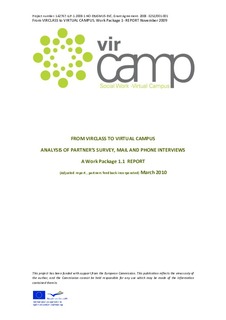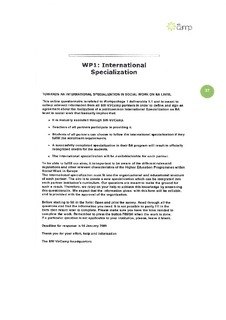| dc.contributor.author | Arias, Andrés | |
| dc.contributor.author | Veenkamp, Remmelt | |
| dc.contributor.author | Larsen, Anne Karin | |
| dc.date.accessioned | 2018-02-01T15:08:15Z | |
| dc.date.available | 2018-02-01T15:08:15Z | |
| dc.date.issued | 2010-03 | |
| dc.identifier.citation | http://vircamp.net/ep_tmp/files/19617500784bd7f3ff42d96.pdf | en_US |
| dc.identifier.uri | http://hdl.handle.net/11250/2481744 | |
| dc.description | Grant Agreement: 2008 -3252/001-001 | en_US |
| dc.description.abstract | The most important result aimed for in this project is that major steps forward will have been made in the realization of an international specialization in social work, which really addresses European issues of social cohesion and intercultural dialogue, these being issues of major importance for professional social workers in Europe. International cooperation between (future) professional social workers is a necessity for this and an international Virtual Campus is an excellent tool to realize this objective, in part because physical international mobility is often problematic. A Virtual Campus then, as an international, multifunctional learning/communicating community, is a major step beyond an international virtual classroom, in which many partners already have some experience through their VIRCLASS cooperation. The overall project objective is that social work students (future social work professionals) will be more competent to meet the needs of a knowledge based, intercultural, socially cohesive European society, by means of an international bachelor social work specialization realized via a Virtual Campus, an international social work learning community. This report focuses on one of the main objectives of the project: Integration of an International bachelor Specialization in social work (called IS hereafter), implying realization of a shared/tuned framework for this specialization—Bologna aligned and tuned with relevant national quality standards. The report outlines the possibilities presented in each of the 12 SW-VirCamp partner institutions to reach this objective. The report is based on an analysis of data from an online questionnaire survey and a series of mail and phone interviews with the representatives of the 12 partners in the SW-VirCamp project. Data shows that the IS seems to be feasible for most of the universities involved. (1) two partner institutions are ready for this in the short term, (2) another nine are able to make it possible in the medium and long term but need to overcome different kind of challenges, and (3) in one university the IS would be extremely difficult to integrate. This document concludes by highlighting: a) the main challenges for setting up the IS for some of the partner institutions, b) the principal actions needed in order to be prepared for the IS, and c) a set of points of attention to be further discussed among partners | en_US |
| dc.description.sponsorship | European Commission | en_US |
| dc.language.iso | eng | en_US |
| dc.relation.ispartofseries | SW-VIRCAMP, Social Work-Virtual Campus | en_US |
| dc.relation.ispartofseries | 142767-LLP-1-2008-1-NO-ERASMUS-EVC | en_US |
| dc.subject.other | education | en_US |
| dc.subject.other | virtual campus | en_US |
| dc.subject.other | europe | en_US |
| dc.subject.other | international cooperation | en_US |
| dc.subject.other | social work | en_US |
| dc.title | From virclass to virtual campus: analysis of partner's suvey, mail and phone interviews. A work package 1.1 report | en_US |
| dc.type | Report | en_US |
| dc.subject.nsi | VDP::Samfunnsvitenskap: 200::Sosialt arbeid: 360 | en_US |

